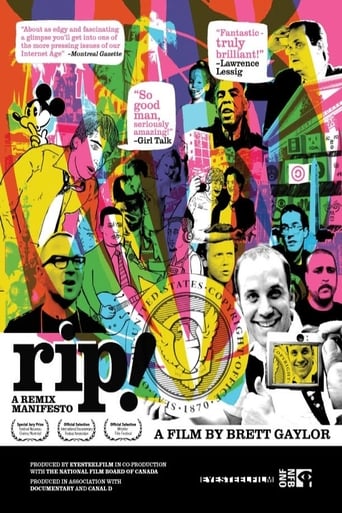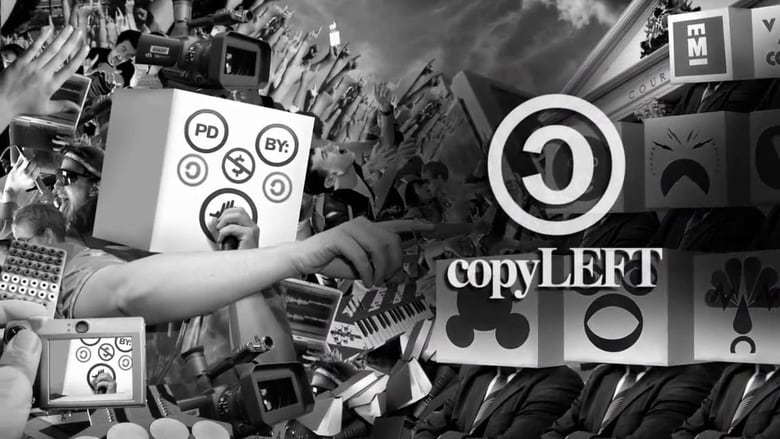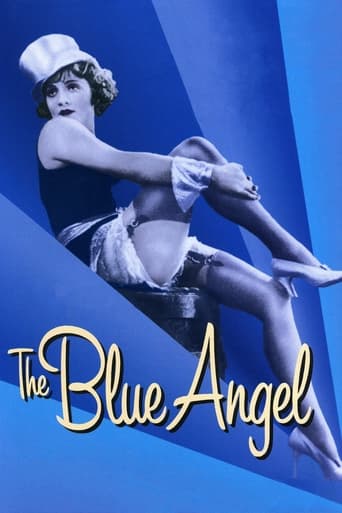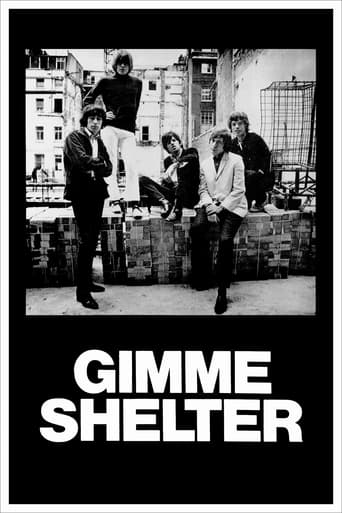RiP!: A Remix Manifesto (2008)
RiP!: A Remix Manifesto is a 2008 open source documentary film about the "the changing concept of copyright" directed by Brett Gaylor.
Watch Trailer
Cast
Similar titles

Reviews
Powerful
hyped garbage
It's fun, it's light, [but] it has a hard time when its tries to get heavy.
The film's masterful storytelling did its job. The message was clear. No need to overdo.
This is an essential film for our modern age and all children, from 7 to 77 or even 107 should be obliged to view it, learn it and memorize it. But before discussing the core of the film, that is to say remixing, mash-up if you want, girl-talk if you prefer, let's get rid of a few misconceptions.First, patents and copyright are not the same thing. Patents are a scandal because they are based on a lie. They are supposed to cover the research expenses of an invention and as such should not be counted in years but should be strictly limited to the amount of expenses concerned by the said invention. If PharmaXXX declares to have spent two million dollars on the research to produce that new drug (and that can easily be checked by any tax inspector who knows his job and is not corrupted), it should be authorized to overcharge the customers by let's say 25% till those two millions, or if you want to be generous and think of encouraging the poor PharmaXXX, 2.5 millions, and then bye-bye excessive profit, the 25% overcharge is out and the protection falls.Second, ideas are not protected, I repeat ideas are not protected. Molecules cannot be protected because they are no one's property. Should we protect oxygen as the property of Mr. Dupont de Nemours? To go back to art, ideas cannot be protected, but characters are and the form these ideas are expressed in are too.Third, the film deals with the fundamentalist aspect of copyright in Northern America. I used "fundamentalist" because it is pure industrial terrorism that has nothing to do with intellectual property since these corporations never invented these characters, musics, videos, films, etc. They have at best produced them and have to be compensated for their productive activity, but not for the invention and creation of these artistic works.Fourth, we are not dealing first in this film with illegal downloading which is a completely different business. Mash-up artists do not need to be using illegally downloaded works. Mash-up artists can, and should, use legally downloaded and bought works. And what I am going to say now is within that frame of thinking. I do not in any way accept the appropriation of any merchandise, be it oranges or bread, without paying the proper price for it. Shoplifting is a funny sport but a shoplifter knows exactly what the risk he is running into is. And I know from direct experience.That leads me to Lessig and his battle and this time I will move to France, and France is not the only case. Disc Jockeys had a fight with the SACEM (the civil society that collects author's rights for music) to be recognized as creators, as composers of their own. And they were. Their instantaneous compositions with already recorded works that are not of their own are considered as works of their own and they are the authors or composers of these mixed works. The new element is that instead of using old vinyl records and simple turntables and some sound processing consoles, mash-up artists today use digital samplers and digital sound processing machines. There is a battle to fight there and Lessig is right. This is a creative act of its own and it should be permitted in the name of fair use first, because it is really creating an art of its own or making a point of its own (including at the end of the film a satirical pastiche which is authorized by fair use). The artist who does it should be recognized the quality of composer or creator of any type because he is really creating something new with what was not at all of the same type. I don't see how it could even be called plagiarism. In France since jurisprudence, as far as I know, considers that you need a sequence of eight identical notes (in one sequence I said) for it to be called plagiarism, mash-up works cannot be plagiarized works. If it is not plagiarism, then it is creative.Two battles remain to be fought. First the battle against illegal downloading because it is piracy and it is stealing. Then the battle for the recognition of the creative act of any person who is mixing up, mashing up works that are available on any medium. Then let courts decide, if necessary, where the limit between remixing and just copying is. One example: in a textbook I am told that when you get over fifteen lines of collected quotations of one work you have to pay 300 euros. I think that is both silly and counterproductive. The author (if he can have his own say) and the publisher should probably negotiate some kind of highlighting for the concerned work as a promotional deal. But merchants are too often the worst commercial agents of their own goods. They sound like fathers trying to marry their daughters in a heavily patriarchal country. Which is quite old-fashioned and past-minded.This video then is an essential tool but it requires some good background knowledge. For instance the first text about copyright is not the Statute of Anne in 1710, but the Stationers Company Charter in 1557. The Statute of Anne just shifted the copyright from the printer to the author and introduced a time limit on it. Then the film should have checked the American background: copyright and patents are in the same clause of the US Constitution (1787), not in 1776 (the Declaration of Independence?) but then they are instated by two separate laws, the copyright one in 1791 like the Bill of Rights. By being constitutional it cannot be negated expect by a constitutional amendment or by a US Supreme Court decision, which could only deal with details, not the principle.Dr Jacques COULARDEAU, University Paris 1 Pantheon Sorbonne, University Paris 8 Saint Denis, University Paris 12 Créteil, CEGID
This documentary in general focuses around copyright, and the right to remix old music from other artists and it makes some very good points. You only have to look at YouTube to see for yourself; how many video's per day do you think get pulled because it contained some footage, music or sound (even when it concerns fan-art!) that is owned by some company? What started as a battle against copyright-thieves now evolved into a battle of control and money.Even Lars Ulrich from Metallica makes an appearance, in the form of an old interview concerning the whole Napster-debate which is hypocrite to say the least; tape-trading back in the day is what made Metallica so well known to begin with, so this is nothing more then a moneygrabbing issue from him.If you want to know more whats going on behind all the anti-piracy campaigns, then watch this. Its well worth the watch.
We are the sum of all our experiences and what we have learned from other people. Only a new born baby could possibly be 100% original. What happened to George Harrison with the My Sweet Lord/He's So Fine legal case was ridiculous. We need to restore sensibility to our copyright laws. The net effect of today's copyright laws are self serving to the corporations and rarely benefit the original creator. As mentioned previously the original creator is lucky to receive 10% of the final selling price. As with everything else today corporate property rights have higher priority than almost anything else including our democratic freedoms.But I do agree that some protection must be there so that one is rewarded for their hard work. My suggestions: Time limit such as with patents. Too much great creativity is rotting away because some greedy person (most likely not the author) wants more. Don't allow copyrights to be sold. Only the original creator can benefit from his/her work.
This documentary (indeed, manifesto is correct) misses its intended point. On the one hand its arguing for the rights of remixers, on the other hand for the right to share and use, even when the point isn't to make something new out of it. If you really want to effectively argue the first, you shouldn't only try the "throw everything out" argument. If some artist wants to give their work away for free, more power to them (it's their choice). But that is a far cry from arguing that everybody should do that, and that the only allowable business model is charging for live performances.The makers of the documentary should then have asked how the model could be changed so that you keep the good parts of it, while stopping the more egregious overreaches. (Even if it would eventually argue that it is not possible.) Even while Walt Disney used other's ideas, he didn't take their drawings, stories, dialogue etc. as is. So is there a fruitful way to draw a line? But the documentary makes no effort in that direction, and there is little reason to believe anyone on the other side is listening or even starts to think.The makers should have tried to present their arguments to someone (intelligent) who doesn't share their viewpoint, and asked for their rebuttal (with sufficient time to prepare their argument). That's like sharing ideas, man. Like totally not what the movie is about.The point of this documentary isn't helped the fact (IMO) that all the remixes and mash ups in it are pretty awful. And what is good in them could have been achieved without recycling beats and samples. And it is very clear from the documentary that the artists understand that they shouldn't be doing what they are doing under current laws, but no tough questions are asked from them, like why they still think its necessary or better to break them. (The argument is presented as "because I want to, I should be able to.") IMO, The artists involved should stop whining and make a creative commons collection of samples from which to build mash ups, remixes and whatever. Allowing others to make remixes of this documentary is a starting point. (But, again, kinda not the point presented in the movie, which is an argument against the ownership rights of artists and copyright holders.)








